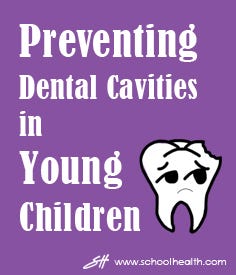- Home
- Preventing Dental Cavities in Young Children
- 866-323-5465
- Mon-Fri, 7am-5pm CST
- Need Help?
Preventing Dental Cavities in Young Children

By the time young children enter an early childhood center or a Head Start program, approximately 90 percent of them are already consuming significant amounts of sugar from fruit juices.
Most adults believe that since fruit juices contain natural sugars and essential vitamins, they are considered a "healthier" alternative to water. Unfortunately while most fruit juices do contain high levels of Vitamin C, they also contain high volumes of sugars, according to Rhea Haugseth, DDS, president of the American Academy of Pediatric Dentistry.
Dr. Haugseth indicates that dental cavities occur when bacteria such as Mutans streptococci and Lactobacilli species convert sugar (glucose, fructose, sucrose and cooked starches) into lactic acid, which make plaque acidic.
Each time the bacteria in the mouth are exposed to any type of food or drink containing any form of sugar, the bacteria produce a 20-minute acid "attack," ultimately causing demineralization of the tooth enamel and underlying dentine. Frequent exposure of enamel to sugars through the constant drinking of juices from bottles, sippy cups, or juice boxes, also greatly increases the risk of dental decay.
Experts also say that sugary drinks not only affect the health of teeth, but also are a significant factor in the rising obesity rates among children. Today, about 33 percent of children and adolescents are obese. And because most obese children become obese adults, the impact to society is startling. Currently, the annual cost to society is estimated at nearly 100 billion dollars.
Both the American Academy of Pediatrics (AAP) and the American Academy of Pediatric Dentistry (AAPD) encourage adults to present water to children from a very young age. The child then learns this behavior and water becomes the drink of choice throughout their life.
Other recommendations to prevent dental cavities include:
-
Do not give infants juice from bottles or juice boxes. Intake of fruit juice should be limited to 4 to 6 ounces for children 1 to 6 years old.
-
Limit the consumption of juice to meal times only. Allowing children to consume juice throughout the day encourages bacteria to form.
-
Replace juice drinks with water or milk.
-
Teach children to rinse their mouth with water after meals to remove acidic plaque.
-
Show children how to brush their teeth after meals and let them know what clean teeth feel like.
In the early childhood setting, create pretend play situations where children practice healthy lifelong habits, like tooth brushing or visiting the dentist for regular checkups and cleaning. To reinforce the healthy habits at home, provide parents resources about ways to keep children's teeth free from caries.
Lastly, it's important that a Dental Home is established before a child turns one years old added Dr. Haugseth. A Dental Home is a comprehensive program that enhances the dental professional's ability to assist children and their parents in the quest for optimum oral health care. It reflects the AAPD's clinical guidelines and best principles for the proper delivery of oral health care to all children, with a concentration on infant/age one patients. For more information about the Dental Home, visit: www.aapd.org/dentalhome.
Shop oral care products in our Oral Health category.
